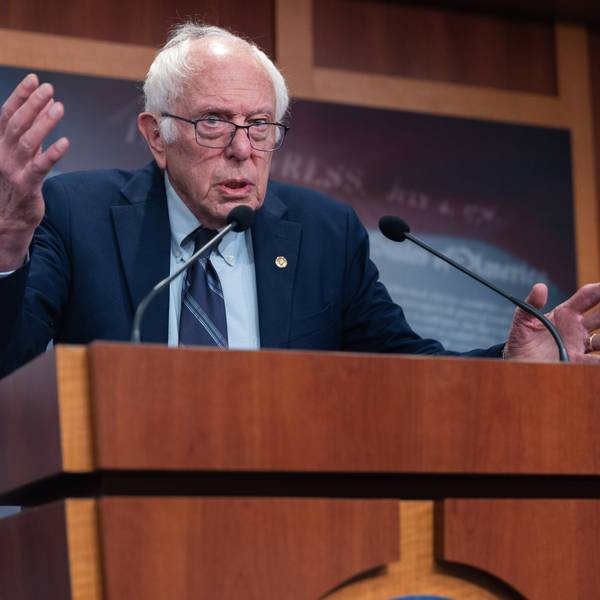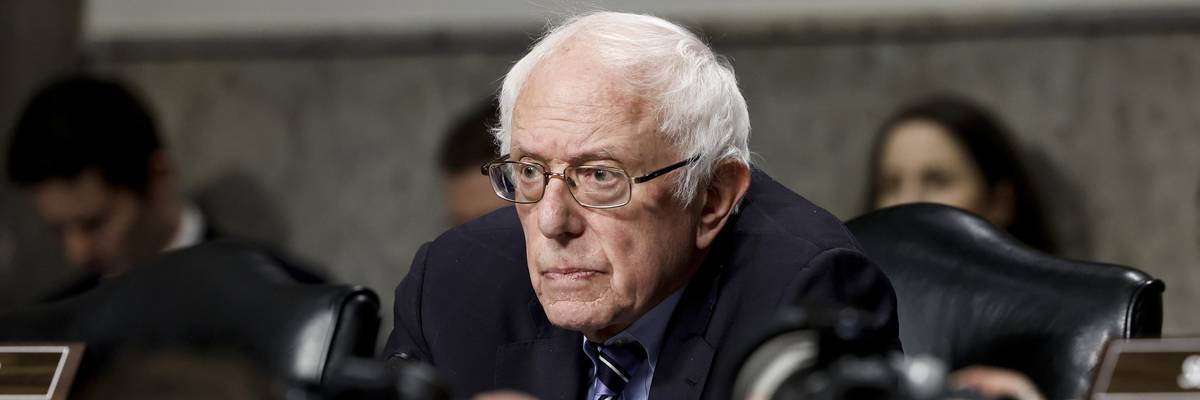Sen. Bernie Sanders announced Monday that he intends to vote against legislation authorizing $886 billion in military spending for the coming fiscal year, arguing the Pentagon budget should be cut in favor of investments in healthcare, education, housing, climate action, and other priorities.
"As a nation, the time is long overdue for fundamental changes to our national priorities," Sanders (I-Vt.) wrote in an op-ed for The Guardian. "Cutting military spending is a good first step."
Sanders, the chair of the Senate Health, Education, Labor, and Pensions (HELP) Committee, has introduced an amendment to the National Defense Authorization Act (NDAA) that would cut the U.S. military budget by 10%. Earlier this month, House Republicans refused to allow a vote on a similar amendment put forth by Rep. Barbara Lee (D-Calif.).
In his op-ed Monday, Sanders pointed to the "enormous crises" facing the U.S., including "unprecedented and rising temperatures" caused by fossil fuel use, a "broken" healthcare system in which insurance and pharmaceutical giants profit while tens of millions go uninsured, a "teetering" education system, and a dire shortage of affordable housing.
"And then there is defense spending. Well, that's a whole other story," Sanders wrote. "The proposed military budget that the Senate is now debating would increase defense spending by $28 billion to over $886 billion, an all-time record. The total is over $900 billion if you include nuclear weapons spending through the Department of Energy."
Sanders argued that in addition to being unnecessary, an even larger military budget would be actively harmful given that the Pentagon "cannot keep track of the dollars it already has, leading to massive waste, fraud, and abuse in the sprawling military-industrial complex."
"Much of this additional military spending will go to line the pockets of hugely profitable defense contractors—it is corporate welfare by a different name," the senator noted. "Almost half of the Pentagon budget goes to private contractors, some of whom are exploiting their monopoly positions and the trust granted them by the United States to line their pockets."
Sanders' opposition to the NDAA comes after House Republicans passed their version of the legislation after packing it with right-wing amendments and rejecting proposed changes aimed at reining in out-of-control Pentagon spending and cracking down on fraud.
The Senate is expected to continue working on its own NDAA this week.
As Congress prepares to authorize around $900 billion for the U.S. military, House Republicans are pushing for steep cuts across the federal government, targeting everything from education programs to climate spending to clean water funds. The House GOP proposals have heightened concerns that the government will shutdown on September 30, the end of the fiscal year.
Meanwhile, Sanders said in a statement Monday that he has had "very productive conversations" with members of the Senate HELP Committee on bipartisan legislation to address the nation's worsening primary care crisis. Sanders said he hopes to have a bill ready by the first week of September.
Last week, Sanders introduced legislation that would invest $20 billion over a five-year period into expanding community health centers. The senator said the measure would "provide the resources necessary to recruit, train, and retain tens of thousands of primary care doctors, mental health providers, nurses, dentists, and home healthcare workers."
The nation is currently hurtling toward a primary care cliff. If Congress doesn't act by September 30, community health centers across the U.S. will face a devastating 70% funding cut.
The National Association of Community Health Centers estimates that nearly 7 million people will lose access to healthcare if Congress doesn't extend the critical funding.
"As every American knows, our country faces a major crisis in primary care and a massive shortage of doctors, nurses, mental health professionals, and dentists," Sanders said last week. "Tens of millions of Americans live in communities where they cannot find a doctor while others have to wait months to be seen."
"At the end of the day," he added, "this crisis not only increases human suffering and unnecessary deaths, but wastes tens of billions a year as Americans flock to expensive ER rooms or hospitals because they could not access the primary care they need."




